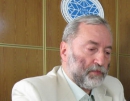|
Analytics
 |
|
 |
|
 |
| Twenty years after |
| 29.01.2010, Communities of Eurasia |
May, 2009 we reached an emblematic date in the recent Jewish history – the twenty years anniversary of the All-Union Round Table on the problems of Soviet Jewry. |
|
 |
| JDC in the CIS: What's up? |
| 25.11.2009, Communities of Eurasia |
The New York newspaper “My Zdyes”(We Are Here) has recently published an extensive analytical report on the matter, prepared by a group of Israeli and Russian experts speaking on condition of anonymity, ordered by Moscow entrepreneurs who are deeply involved in Jewish philanthropic activities. |
|
 |
| Jewish Culture in Russia: an Insider’s View |
| 25.11.2009, Communities of Eurasia |
Lack of an intellectual elite, of a tradition of learning and interpreting texts, and of a common cultural canon, relevant to the given place and time, leads to atrophy of the cultural languages and therefore to loss of values and blurring of moral and ethical boundaries. |
|
 |
|
 |
|
 |
|
 |
| The Restitution of Jewish Propriety in Ukraine |
| 16.10.2009, Restitution |
The recognition of property rights is one of the most important components of social relations. What self-evidence is there that the inviolability of property rights in the sense of biblical heritage is very important for the entire history of Judaist-Christian civilization? |
|
 |
| Anti-Semitism in Belarus |
| 16.10.2009, Xenophobia and anti-Semitism |
Despite a certain liberalization throughout 2008, Belarus still remains one of the few states on the territory of the former Soviet Union, which has retained nearly all attributes or a totalitarian regime. |
|
|
«
27
28
29
30
31
32
33
|
|
|
